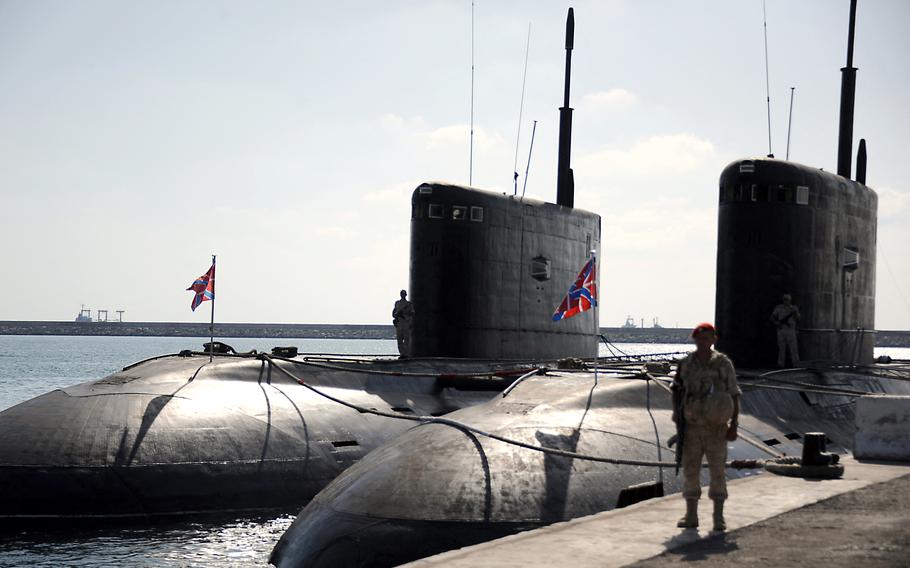
As Vladimir Putin gives asylum to Bashar al-Assad in Moscow, Russia is facing the loss of its naval base in Tartus, Syria — its only hub on the Mediterranean Sea. (Maxime Popov, AFP via Getty Images/TNS)
(Tribune News Service) — The fall of Bashar al-Assad in Syria represents a personal defeat for Russian President Vladimir Putin and a potentially serious strategic setback for his military that undermines Moscow’s global ambitions.
While Putin gives asylum to Assad in Moscow, Russia is facing the loss of its naval base in Syria — its only hub on the Mediterranean Sea — and an airfield used to supply its operations in Africa. Both installations have been key to the Kremlin’s projection of strength on the world stage and its attempts to rebuild its Cold War-era influence — those efforts, and the bases, now look worthless as Russia’s attention is consumed by its invasion of Ukraine.
Moscow will make every effort to retain its Syrian bases, though there’s no guarantee it will succeed, said two people close to the Kremlin, asking not to be identified discussing policy matters. It’s likely that Russian forces will have to withdraw from the bases, according to a third person.
With opposition groups now in control of the Middle East country, the Kremlin is scrambling to establish contacts with Syrian armed factions it had dismissed as “terrorists” and was targeting with air strikes just days ago. Their sudden takeover came more than nine years after Putin sent Russian forces to Syria in 2015 to bolster Assad’s regime and turn the tide against rebel forces.
Russia gained 49-year leases in 2017 to the naval base in the city of Tartus and the airfield at Khmeimim that supplies its African operations.
There’ll have to be a “serious conversation” about the future of the bases with whoever comes to power in Syria, though it’s too early to discuss this now, Kremlin spokesman Dmitry Peskov told reporters on Monday, the Interfax news service reported.
There’ll be “tough negotiations” ahead to safeguard Russia’s interests, said Elena Suponina, a Moscow-based Middle East expert.
Putin’s Syria intervention helped restore Russia’s standing in the Middle East that had been eroded after the Soviet Union’s collapse. His inability or unwillingness to save Assad this time underscored how much Russia’s military is being depleted by the war in Ukraine.
Assad’s sudden defeat shows that “Moscow doesn’t have the military forces, influence and authority to effectively intervene militarily outside the former Soviet Union,” said Ruslan Pukhov, head of the Moscow-based Center for Analysis of Strategies and Technologies, a defense think-tank. The quick turnaround in Syria mirrors the Taliban’s takeover in Afghanistan and the chaotic evacuation of U.S.-led forces, he added.
“Russia has lost its key ally in the Middle East,” the Kommersant newspaper headlined its top story Monday.
African air bridge
The Kremlin has also spent years rebuilding its Soviet clout on the African continent, where it supports military juntas and other leaders cut off from Western aid in Mali, Burkina Faso, Niger and the Central African Republic.
The Khmeimim base is key to Russia’s ability to send supplies and military hardware to those governments. Its loss would have profound implications for Russia’s African clients who may be forced to recalibrate their partnership with Moscow.
The airbase has served as a logistics hub for flights to Libya, Central African Republic and Sudan, according to two senior Western diplomats based in Africa with knowledge of the situation.
Russia has started to remove equipment from Khmeimim and to withdraw warships from Tartus, Ukrainian military intelligence reported Sunday on its Telegram channel, without indicating how it knew this.
Rebel forces in Syria’s coastal regions where the two bases are located haven’t entered the facilities, the Russian state news service Tass reported Monday.
The Russian Foreign Ministry said Moscow is maintaining contact with “all Syrian opposition groups,” in a statement on Sunday. While Russia’s Syrian bases are on high alert, there’s no serious threat to their security at the moment, it said.
The head of the HTS militant group that led the lightning campaign to oust Assad, Ahmed Al-Sharaa, better known by his nom de guerre Abu Mohammed Al-Jolani, told CNN in a recent interview that he wants foreign forces out of Syria. Both Turkey and the U.S. also have a military presence in the country.
Turkey, which backed the rebel forces, may hold the key to whether Russia is able to keep hold of its military assets in Syria. While Putin and Turkish President Recep Tayyip Erdogan backed opposing sides in the Syrian war, they also sought for years to reach a resolution to the conflict that protected their countries’ interests.
“Even if Russia maintains some or all of its bases in Syria, it is a major geopolitical loss for Moscow as Russia’s continued basing in Syria will be at the mercy of Syrian opposition groups,” the Washington-based Institute for the Study of War said in a report Sunday.
The incoming administration of U.S. President-elect Donald Trump may see an opportunity to reduce Russian influence in the Middle East.
“Russia has its hands full with Ukraine and their position has been weakened,” said Jason Greenblatt, a former Middle East envoy in the first Trump administration. The continued presence of Russian bases in Syria would be “unhelpful” and Trump may seek a “serious discussion” with Putin about that, he said.
With assistance from Simon Marks.
©2024 Bloomberg L.P.
Visit bloomberg.com.
Distributed by Tribune Content Agency, LLC.